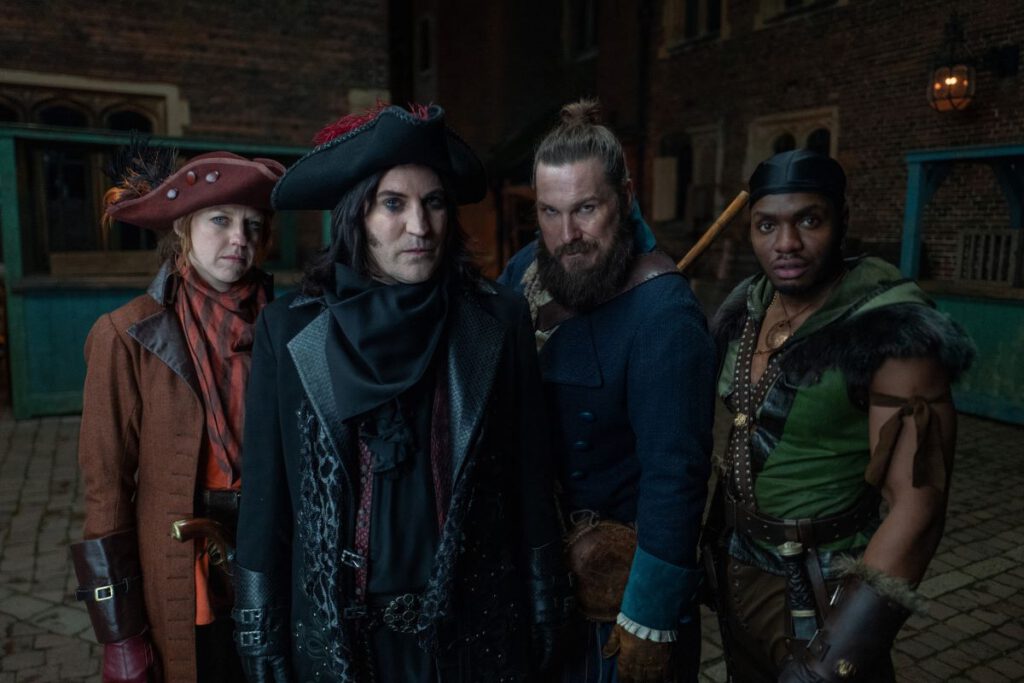Call it the “Drunk History” effect—from Hulu’s “The Great” to Max’s “Our Flag Means Death,” television has been smack dab in the middle of an irreverent historical renaissance the last few years. Slap a frock or two on a few highbrow actors, give them decidedly contemporary, conversational dialogue, and juxtapose such postmodern naturalism against the medieval misery of the time, and in the words of the late, great Carl Weathers, you’ve got a stew going.
That said, Apple TV+’s new historical sitcom “The Completely Made-Up Adventures of Dick Turpin” shares more than a little DNA with “Blackadder,” another jagged tale of British history that painted the nation’s royal lineage with no small amount of modern jaundice. No one likes to lampoon its own history quite like the Brits, and “Dick Turpin” leaves plenty of opportunity to send up the frippery and pomp of its 18th-century past. Too bad, then, that it can’t offer a whole lot more than six episodes of repetitive, shrugging casualness—it’s a show with one joke about its upside-down take on history and legend, which it bashes over its audience’s head like a loose cartwheel.
Creators Claire Downes, Ian Jarvis, and Stuart Lane took clear inspiration from the tall-tale nature of the real-life Turpin’s legend: a famed highwayman whose exploits were recounted with romantic detail after his untimely hanging at 33—first by tabloid pamphlets, then by author William Harrison Ainsworth in his 1834 novel “Rookwood.” “Dick Turpin” mines the gap between legend and reality for maximum silliness, crafting a giddy, semi-magical version of 18th-century England populated with warlocks, witches, and all manner of colorful characters.

And all of it centers on Turpin (Noel Fielding), a butcher’s failson whose flights of fancy find purchase when he’s inadvertently roped into joining, then accidentally killing the leader of, a gang of highwayman. You keep what you kill, of course, so now the gang belongs to Turpin, a highwayman who’s never so much as held a pistol. “So I just push that button and it comes out that tube?” he asks.
Even so, Turpin’s wild-eyed excitement and off-kilter imagination helps him and his Essex Gang build a reputation for themselves—aided, of course, by Eliza Bean (Dolly Wells), whose pamphlets of his exploits turn him from rogue to legend. (Insert anachronistic gag about the public’s zeal for true crime here.) But that same fame also earns them the ire of “thief-taker general” Jonathan Wild (Hugh Bonneville), a fellow criminal who styles himself as a lawmaker, determined to bring in Turpin for disrupting his lucrative grift.
Fans of “Our Flag Means Death” will find particular comfort in the show’s tone: a series of cock-and-bull stories told with an exceedingly laidback and conversational breath, bouncy and jaunty and very, very fuzzy. (One major side character is a giggly little magician named Craig the Warlock (Asim Chaudhry), whose name is kinda the whole joke.)
One of the show’s biggest hurdles, sadly, is Fielding, a comedian who’s made a name for himself on shows like “The Mighty Boosh” and “The IT Crowd” before settling nicely into a presenter role as the cuddly, aging-goth mascot of “The Great British Bake-Off.” Fielding’s absurdist appeal has always come from his soft, velvety purr and uncanny appearance—pale, rounded mug grinning impishly under a mop of wavy, stringy black hair. He’s like the world’s friendliest vampire, or if someone dipped Russell Brand in toffee and made him nice.

In some ways, that works for the character of Turpin, here styled like a reluctant criminal mastermind in over his head, confident his exuberance will make up for a lack of skill or experience. But Fielding’s not a natural actor, so there’s little for him to play except what’s on the page—there’s a feeling of waiting to say his line and shutting down while waiting to say his next joke. Most scenes with him read like the opening skit to any given episode of “Bake Off.”
As such, the rest of the cast have to work overtime to keep up with his stand-there-and-smirk antics while also using them as a bellwether for their own performances. That’s especially true of Turpin’s gang: Ellie White’s Nell is the standout, the hypercompetent woman who holds the team aloft and is nonetheless reluctantly charmed by her idiot boss’ antics. The other two boys, Duayne Boachie’s Honesty and Marc Wootton’s Moose, are interchangeably goofy in ways that serve their performers ill. Bonneville, and perhaps Tamsin Greig’s criminal mastermind Lady Helen, are the few who break that mold; Connor Swindells also delights as a foppish competitor to Turpin for the marker of England’s swishiest outlaw.
That’s a symptom of the show as a whole, sadly; the show lands on its absurd tone early on, but rarely deviates from it. Quite a few bits are wonderful fun—take an extended Bloody Mary-esque gag where Turpin and gang try their best not to utter a dreaded witch’s name 27 times, to predictable results. But unlike “Our Flag Means Death,” or another show that does this kind of historical camp better, TBS’s “Miracle Workers,” there’s little pathos to balance out the sugar. It’s just one-note silly all the way through, which can get repetitive even in a brisk six-episode season.
This is not to say that “Dick Turpin” isn’t lighthearted fun: it’s a frothy and inconsequential comedy, and the snappy, jaunty score by Oli Parker and Nate Jackson is an anachronistic plus. But it’s hard not to crave more from your historical comedies, especially in an environment with such clever, inventive examples that also happen to make you care about its characters. Apple’s latest hero may have stolen loads of gold, and maybe even a cursed emerald or two, but it hasn’t quite captured my heart yet.
Entire six-episode season screened for review. “Dick Turpin” airs March 1st on Apple TV+.












